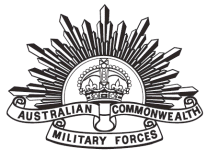

| Regimental number | 276 |
| Place of birth | Cootamundra, New South Wales |
| Religion | Church of England |
| Occupation | Labourer |
| Address | Wallendbeen, New South Wales |
| Marital status | Single |
| Age at embarkation | 24 |
| Next of kin | Thomas Hobson, Ganangalla Road, Murrumburrah, New South Wales |
| Previous military service | Served in the 11th Australian Light Horse for 2 years; still serving at time of AIF enlistment. |
| Enlistment date | |
| Rank on enlistment | Private |
| Unit name | 1st Light Horse Regiment, B Squadron |
| AWM Embarkation Roll number | 10/6/1 |
| Embarkation details | Unit embarked from Sydney, New South Wales, on board HMAT A16 Star Of Victoria on |
| Rank from Nominal Roll | Private |
| Unit from Nominal Roll | 56th Battalion |
| Fate | Killed in Action |
| Place of burial | No known grave |
| Commemoration details | The Ypres (Menin Gate) Memorial (Panel 29), Belgium The Menin Gate Memorial (so named because the road led to the town of Menin) was constructed on the site of a gateway in the eastern walls of the old Flemish town of Ypres, Belgium, where hundreds of thousands of allied troops passed on their way to the front, the Ypres salient, the site from April 1915 to the end of the war of some of the fiercest fighting of the war. The Memorial was conceived as a monument to the 350,000 men of the British Empire who fought in the campaign. Inside the arch, on tablets of Portland stone, are inscribed the names of 56,000 men, including 6,178 Australians, who served in the Ypres campaign and who have no known grave. The opening of the Menin Gate Memorial on 24 July 1927 so moved the Australian artist Will Longstaff that he painted 'The Menin Gate at Midnight', which portrays a ghostly army of the dead marching past the Menin Gate. The painting now hangs in the Australian War Memorial, Canberra, at the entrance of which are two medieval stone lions presented to the Memorial by the City of Ypres in 1936. Since the 1930s, with the brief interval of the German occupation in the Second World War, the City of Ypres has conducted a ceremony at the Memorial at dusk each evening to commemorate those who died in the Ypres campaign. |
| Panel number, Roll of Honour, Australian War Memorial | 162 |
| Other details |
War service: Egypt, Gallipoli, Western Front Proceeded to join the Mediterranean Expeditionary Force, Gallipoli, 9 May 1915. Admitted to No. 1 Australian Stationary Hospital, Mudros, 15 November 1915 (hydatids); transferred to england, 25 November 1915, and admitted to Brook War Hospital, Woolwich, 4 December 1915. Admitted to Great Peter Street War Hospital, London, 2 May 1916; discharged, 18 July 1916; total period of treatment for venereal disease: 78 days. Admitted to 1st Australian Dermatological Hospital, Bulford, 10 August 1916; transferred to Fovant War Hospital, 9 September 1916; discharged, 29 September 1916; total period of treatment for venereal disease: 51 days. Proceeded overseas to France, 16 November 1916; taken on strength, 56th Bn, 7 December 1916. Admitted to 14th Field Ambulance, 28 December 1916 (mumps); admitted to 25th Stationary Hospital, Rouen, 31 December 1916; rejoined unit, 7 February 1917. Admitted to 8th Field Ambulance, 8 June 1917 (painful adhesions); rejoined unit, 28 June 1917. Killed in action, 28 September 1917. Medals: 1914-15 Star, British War Medal, Victory Medal |